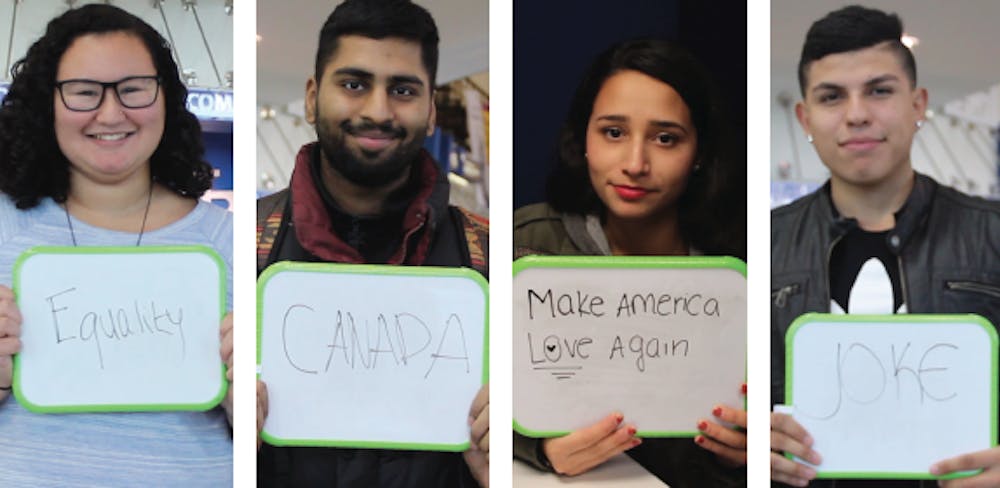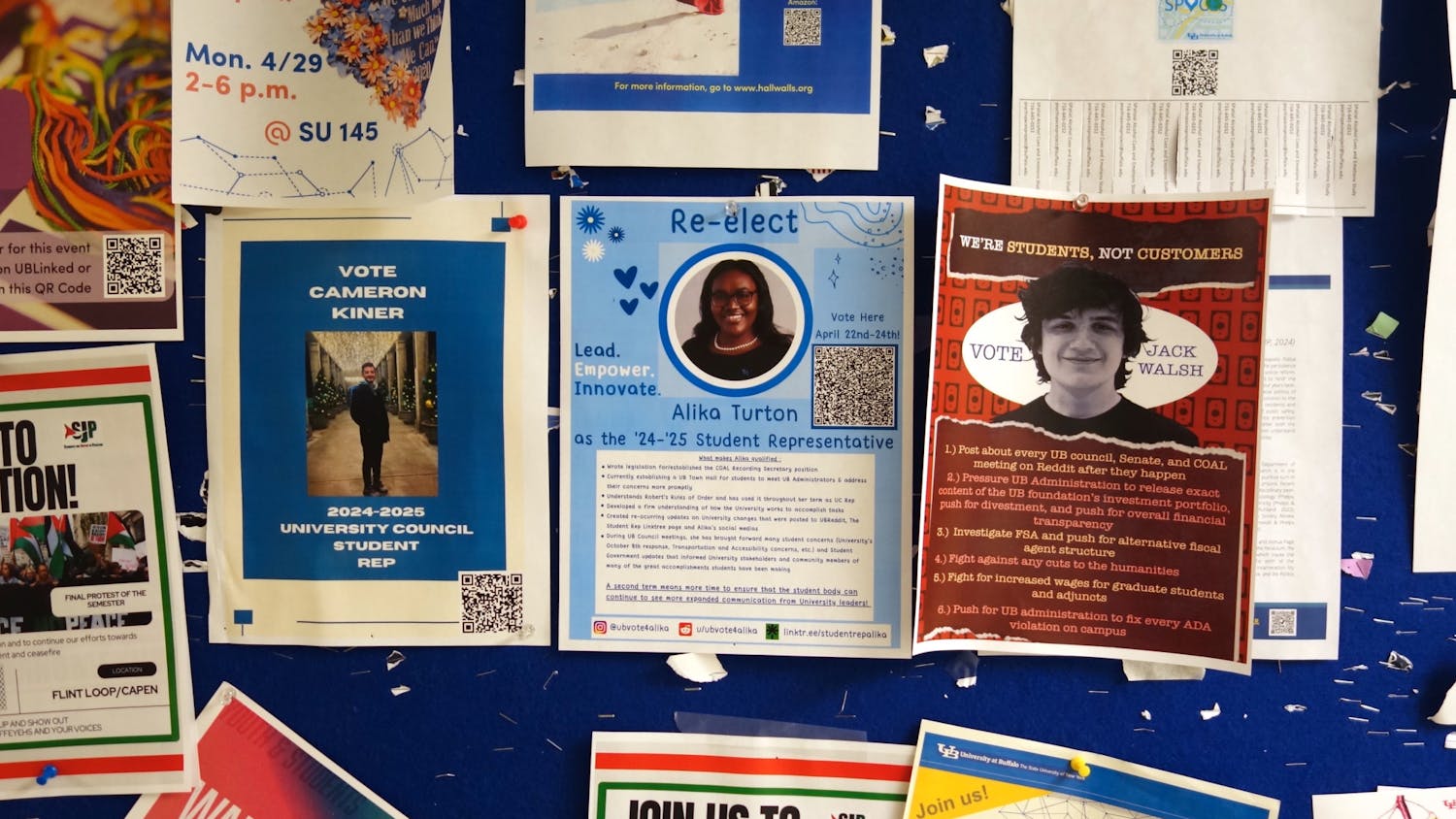Alexandra Furtzaig thinks this year’s presidential election has played out like a reality show.
Furtzaig, a junior communication and psychology major, feels politics have been overshadowed by entertainment.
Students, like Furtzaig, think the presidential election has been marred with name-calling and shocking, crude behavior. Students feel the media focuses more on Republican presidential candidate Donald Trump’s controversial behavior and Democratic presidential candidate Hillary Clinton’s scandals, than their platforms and policies. The lack of political substance has left many students feeling uninformed and disengaged on the specific policies of the presidential candidates.
Samantha Barbas, professor at UB’s law school, attributes the circus-like atmosphere of this year’s election to social media.
“A lot of the discussion of the election and even the candidates’ communication is taking place via social media, so that gives it a totally different tone,” Barbas said. “I think [the election] is more shocking and nasty and highly opinionated [because] comments can be more personal and full of sound bites and short insults.”
The Spectrum asked students to describe the presidential election in one word in an election poll. There were more than 200 responses, many of which were “joke,” “comical” and “chaotic.”
“I think the media has spent more time on the scandals and personalities of the presidential candidates, in part because particularly Donald Trump has made the election about his personality and scandals and not about issues,” Barbas said. “In some ways, that’s the media’s fault, but a lot of it is they’re just covering what the candidates themselves are raising.”
Barbas said the media has a duty to report on Trump’s actions. She also thinks it’s possible that millennials will become disengaged from future elections due to the over-the-top nature of this election.
“I do think this election sets a very dangerous precedent – that the election is something to be spectated and that the election is something to be looked at through the lens of social media and not through serious, issue-driven politics,” she said.
Elijah Dunbar, a freshmen computer science major, thinks this year’s presidential election is a “circus.”
He said the media tends to focus heavily on Trump because what he says captures people’s attention and “makes for a good story.”
“It is true that Trump is very newsworthy in the sense that he provides so many great quotes both in his written lawsuits and scandals and everything. I think there’s a commercial interest for the media to want to be covering him,” Barbas said.
Barbas said social media provides millennials with easy access to the news, but wonders where exactly students are getting their news.
Both Dunbar and Afee Daiyan, a freshman computer science major, said they have a relatively small gauge of the policies of the presidential candidates, yet they still plan on voting. They feel a social pressure to vote although they mostly keep up with the election through social media rather than reputable news sources.
“It’s more of a social thing, where you have to vote or you’re looked down upon, especially when it comes to family,” Daiyan said.
Rachel Cope, a sophomore communication major, said most of her knowledge about the presidential election comes straight from what her friends discuss on social media.
“If they look at the New York Times [on social media] and it links to a Times story, I think that’s useful, but if they’re just getting it from other people’s opinions that are being retweeted or something, that can be very dangerous,” Barbas said.
Barbas tries to educate students in her classes about the election, depending on the class she’s teaching. She said if she were teaching a media law class, she would definitely be discussing the presidential election, but because she isn’t teaching that particular course this semester, politics don’t really come into play.
Barbas believes it’s important for millennials to vote in the presidential election.
“[There is] the fear of millennials becoming disengaged and if they don’t vote now, it’s just gonna set a pattern of ‘my vote doesn’t matter’ or ‘I don’t have a place in democracy’ so it’s kind of scary,” she said.
Many students feel both candidates are untrustworthy, making it even more difficult to take the election seriously.
This feeling stems from the Clinton email scandal and Trump’s pattern of denial throughout the presidential debates.
“You never would even think Trump would get this far and [the same] with Hillary,” Dunbar said. “Personally, I don’t really want either of [the presidential candidates] but you just have to pick the lesser evil so it’s just like a circus.”
Dunbar feels if Donald Trump can become president, anyone rich and powerful will try to become president.
Daiyan also never thought Trump would get this far in the presidential election.
“When Donald Trump first started, we all thought it was a joke, but it actually became serious and that’s when it became scary,” Daiyan said.
Recent polls indicate that millennials will continue to vote heavily for the Democratic candidate in the election, according to the Washington Post.
These polls also suggest there’s a considerably higher swing toward supporting a third-party candidate.
“I don’t think any of the independent candidates really have a chance so you might as well throw your vote at the lesser evil in my opinion,” Dunbar said. “But as an American, the whole purpose of voting is to vote for who you think is the best candidate.”
Barbas said the nation has yet to determine if there will be criticism of news organizations’ coverage of the election in its aftermath.
“It could be a moment where we say ‘oh my God, we really did it wrong, we have to get back to more serious discussion’ and I kind of feel that Americans are already feeling that way,” Barbas said. “They’re already feeling like [this election] has been a fiasco. I don’t think anyone feels good about what’s happened in the past few months.”
Ashley Inkumsah is a senior news editor and can be reached by email at ashley.inkumsah@ubspectrum.com and on Twitter at @AshleyInkumsah.





